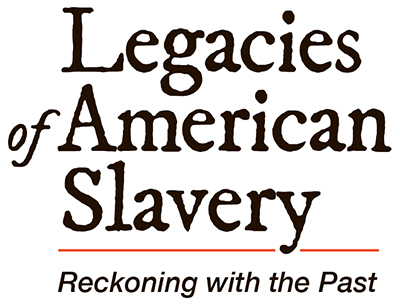 “Legacies of American Slavery” Network
“Legacies of American Slavery” Network
Austin College today became one of seven colleges and universities selected by the Council of Independent Colleges in Washington, D.C., to serve as Regional Collaboration Partners for the multiyear project “Legacies of American Slavery: Reckoning with the Past.”
The initiative will consider the ongoing effects of slavery on American life, and the associated CIC grant funds will support campus- and community-based research, teaching, and learning about the legacies of slavery.
Writing in support of the program application, Austin College President Steven O’Day proposed that Austin College is uniquely situated, geographically and in terms of resources and expertise, to serve as a Regional Collaboration Partner. “The project team, led by Dr. Gregory Kinzer and Dr. Felix Harcourt, is exceptionally well-suited to lead regional programming and collaborations,” he wrote, elaborating on Kinzer’s past leadership of the AC Writes Quality Enhancement Plan initiative as part of the SACS-COC reaccreditation. President O’Day also highlighted Harcourt’s related scholarly research on issues of race, prejudice, and violence, with a particular focus on the history of the Ku Klux Klan.
President O’Day also said that a diverse and united community is at the core of the Austin College community. “Valuing, promoting, and understanding diversity are fundamental to Austin College,” he said. “We prepare our students to become leaders in an increasingly diverse world. Participation in the Legacies of American Slavery Project will continue to propel Austin College forward as we strive to be a place where all people feel equally valued and free to participate in the life of the college.”
Harcourt echoed his enthusiasm for the project. “Our participation in the project will empower students, faculty, and staff to engage with the Texoma community to build greater understanding of our regional and campus history,” he said. “Austin College’s leading role in driving forward the national conversation on these important and timely topics reflects our institutional commitment to diversity, equity, and inclusion on campus and beyond.”
As Dean of Humanities, Kinzer is happy for his colleagues. “We are all honored and thrilled to be chosen to be part of this initiative,” he said. “I know that members of the History Department, plus a large group of faculty across divisions, are working to develop exciting ideas for the development of this project now that we’ve received word of our Partner status.”
Richard Ekman, president of CIC, said choosing just seven partners from a strong pool of applicants was difficult, and that the level of work seen bodes well toward the success of the national project. “The selection process highlighted the depth and breadth of scholarship, teaching, and public engagement that many CIC members have already devoted to exploring the pervasive legacies of slavery,” he said.
The higher education partners will serve as part of a national network that will expand to include additional CIC member colleges and universities. Each Partner will focus on a specific theme of local and national significance and organize regional activities that will be part of a larger conversation about race, freedom, political power, equity, and cultural resilience.
The Partners and their organizing themes include the following:
- Austin College (Texas): “Racial Violence and Resistance”
- Centenary College (Louisiana) and Huston-Tillotson University (Texas) in partnership: “Race, Health, and Medicine”
- Dillard University (Louisiana): “Cultural Creativity”
- Lewis University (Illinois): “Race, Place, and Migration” with “Mass Incarceration” as a secondary theme
- Meredith College (North Carolina): “Contested Citizenship” with “Economic Disparities” as a secondary theme
- Sewanee: The University of the South (Tennessee): “Commemoration and Memory.”
CIC also has designated a dozen Institutional Affiliates to play a foundational role in developing regional and national networks: Bloomfield College (New Jersey), Columbia College Chicago (Illinois), Drury University (Missouri), Fisk University (Tennessee), Fontbonne University (Missouri), Johnson C. Smith University (North Carolina), Messiah University (Pennsylvania), Roanoke College (Virginia), Shenandoah University (Virginia), Tougaloo College (Mississippi), Ursuline College (Ohio), and Wofford College (South Carolina).
The Partners and Affiliates represent a diversity of institutional types and sizes, including two women’s colleges and five HBCUs. Several of the institutions located in Confederate states have historical links to slavery as former sites of plantations; others were founded or influenced by abolitionists.
Legacies of American Slavery is directed by Pulitzer-Prize winning historian David W. Blight, Sterling Professor of American History at Yale University and executive director of the Gilder Lehrman Center for the Study of Slavery, Resistance, and Abolition (GLC) at Yale’s MacMillan Center. Blight describes the relevance of the project in a special essay commissioned by CIC: “Because slavery is so central to the history of the United States—its origins, economic development, society, culture, politics, and law—it has left in its wake a wide array of legacies that seem ever-present yet ever-changing in our world.”
The essay is available on the CIC website. The entire project is generously supported by the Andrew W. Mellon Foundation with supplemental funding from the National Endowment for the Humanities.
Programmatic activities will begin later this spring and build toward a series of regional conferences hosted by the Regional Collaboration Partners.
The Council of Independent Colleges (CIC) is an association of 765 nonprofit independent colleges and universities, state-based councils of independent colleges, and other higher education affiliates, that works to support college and university leadership, advance institutional excellence, and enhance public understanding of independent higher education’s contributions to society. CIC is the major national organization that focuses on services to leaders of independent colleges and universities and state-based councils. CIC offers conferences, seminars, publications, and other programs and services that help institutions improve educational quality, administrative and financial performance, student outcomes, and institutional visibility. It conducts the largest annual conferences of college and university presidents and of chief academic officers in the United States. Founded in 1956, CIC is headquartered at One Dupont Circle in Washington, DC. For more information, visit www.cic.edu.
Austin College, a private national liberal arts college located north of Dallas in Sherman, Texas, has earned a reputation for excellence in academic preparation, international study, pre-professional foundations, leadership development, committed faculty, and hands-on, adventurous learning opportunities. One of 40 schools profiled in Loren Pope’s influential book Colleges That Change Lives, Austin College boasts a welcoming community that embraces diversity and individuality, with more than 50 percent of students identifying as persons of color. The residential student body of approximately 1,300 students and more than 100 expert faculty members allow a 12:1 student-faculty ratio and personalized attention. Related by covenant to the Presbyterian Church (USA), Austin College cultivates an inclusive atmosphere that supports students’ faith journeys regardless of religious tradition. The College, founded in 1849, is the oldest institution of higher education in Texas operating under original name and charter.



